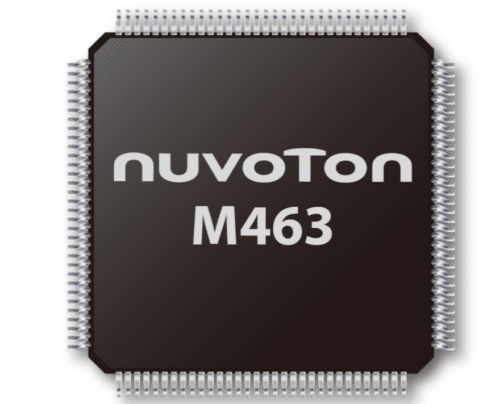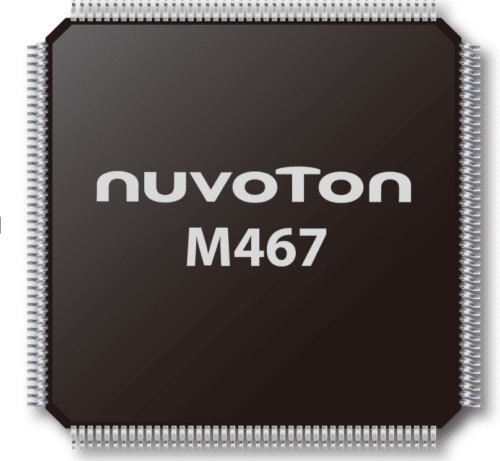Discover Nuvoton’s microcontrollers: the M463 CAN FD/USB HS Series and the M467 Ethernet/Crypto Series, these versatile chips are essential for IoT, industrial control, data centers.
Nuvoton has unveiled a pair of advanced microcontrollers: the M463 CAN FD/USB HS Series and the M467 Ethernet/Crypto Series. These microcontrollers serve as essential building blocks for various applications and systems, encompassing IoT gateways, industrial control, telecommunications, data centres, smart grid management, motor control for white goods, small TFT LCDs, and TinyML (Machine Learning) devices. Additionally, the M463 excels in gaming applications. These microcontrollers offer extensive compatibility with various popular real-time operating systems (RTOS) and graphical user interface (GUI) libraries, with readily available sample code for numerous practical scenarios. While these microcontrollers share several standard features, such as the Arm Cortex-M4F core, each chip boasts unique capabilities tailored to specific applications.
An All-Inclusive CAN Solution on a Single Chip
The M463 CAN FD/USB HS series of 32-bit microcontrollers is centered around the Arm Cortex-M4F core, equipped with a DSP instruction set and a single-precision floating-point unit (FPU). It provides up to 256 KB of Flash memory and up to 128 KB of SRAM, which includes hardware parity check capabilities.

The microcontroller offers comprehensive on-chip support for various digital and analog peripherals, enhancing cost-effectiveness by featuring 2 CAN FD buses, USB High-Speed OTG, and up to 24 channels of 16-bit PWM. It includes UART, SPI/I2S, Quad-SPI, I²C, analog comparators, and the capacity for up to 16 channels of 12-bit SAR ADC. Specifications include:
- Core operates at up to 200 MHz speeds
- Voltage range spanning from 1.7 V to 3.6 V
- Wide temperature range from -40 °C to 125 °C.
- Active power consumption of 135 μA/MHz at 25°C/3.3V (with peripherals turned off).
All Essentials for Security and Network Connectivity
The M467 Ethernet/Crypto series is a 32-bit microcontroller centered around the Arm Cortex-M4F core. It comes equipped with a DSP instruction set, a single-precision floating-point unit (FPU), and boasts Ethernet 10/100 MAC support.

In terms of analog peripherals, the M467 includes 4 analog comparators, up to 28 channels of 12-bit SAR ADCs, and 2 channels of 12-bit DAC. The series offers a wide array of peripherals, including Ethernet 10/100 MAC, a hardware crypto engine, hardware key storage, a true random number generator (TRNG), a programmable audio PLL, 4 CAN FD buses, USB HS OTG, USB FS OTG, up to 24 channels of 16-bit PWM, 10 UARTs, 4 SPI/I2S interfaces, 2 Quad-SPIs, 5 I²C buses, and 4 Quadrature Encoder Interfaces (QEI)., the M467 series accommodates a broad.
Specifications include:
- Flash memory capacity of up to 1024 KB, featuring a dual bank structure that supports Firmware Over-The-Air (FOTA) updating
- SRAM up to 512 KB with hardware parity checking
- voltage range spanning from 1.7 V to 3.6 V
- Operating at speeds of up to 200 MHz
- wide temperature range, from -40 °C to 105 °C
- power consumption of just 175 μA/MHz at 25°C/3.3V, with peripherals deactivated
Integrated Security Features and Packaging Options
Both microcontrollers include integrated security features like Execute-Only-Memory (XOM) for code protection, hardware secure boot, hardware key storage, AES-256 cryptography acceleration, and PRNG/TRNG. The M467 series expands security with ECC-571, SHA-512, HMAC-512, RSA-4096, and SM2 support for diverse cryptographic operations.
These microcontrollers come in various packages (LQFP and QFN) with sizes mainly determined by the number of I/O pins. M463 has 48 to 128 pins, M467 has 64 to 176 pins, and some variants have an exposed thermal pad (EPAD) for cooling. This flexibility allows users to choose the right package for their design with minimal adjustments, while most other features remain consistent across variants.
The company offers strong product support, including M467 and M463 evaluation boards and the company’s Nu-Link debugger. Compatible third-party IDEs (Keil MDK, IAR EWARM, Eclipse IDE) reduce development time. Both products support RTOS (Mbed OS, Amazon FreeRTOS, Zephyr) and GUI libraries (emWin, LVGL). Sample code covers various TinyML applications (e.g., keyword spotting) and includes examples for creating an e-bike dashboard HMI/GUI with emWin Appwizard, as well as secure data uploads to the internet/cloud via TLS encryption.






